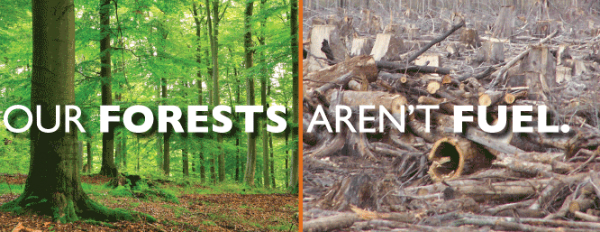Peter Lehner, Executive Director, New York City
As an admitted arborophile, I’m happy to see that tree-planting crews from the New York City Parks Department are kicking their efforts into high gear as winter approaches, planting saplings that can turn barren urban streets into cool, leafy corridors.
Intuitively, we all know that trees are transformative. A single tree can change a neighborhood. But when we walk along a treeless city street, it’s easy to forget what we don’t see. So much of what trees do is invisible. I recently saw an inspiring visualization of the Amazon rainforest that helped bring it home to me. Trees and forests are the lungs that soak up carbon, the heart that pumps out water, the liver that filters out harmful pollutants.
But in the carbon-rich, ecologically diverse forests of the southern United States, trees are … wood pellets?
No way.
Our Southern forests are in danger. European power companies, hungry for biomass fuel, are driving a new and growing demand for wood pellets. That hunger for wood as fuel is being fed — unsustainably — by forests in the Southeastern United States. Millions of tons of trees are being shipped abroad every year to be burned in European power plants.
This week, NRDC, our partners at Dogwood Alliance and other allies in this fight are sending a petition to European leaders, signed by more than 50,000 concerned Americans, urging them to save our Southern forests, stop subsidizing dirty biomass energy and focus on real renewable energy sources like the wind and sun.
When the EU mandated that 20 percent of Europe’s energy should come from renewable fuels, the idea was to curb carbon pollution — not to chop down and burn up the trees that soak up carbon. Healthy forests, with their ability to absorb and hold on to carbon, are the first line of defense against climate change.
Our Southern forests, in addition to being important carbon sinks, protect drinking water supplies for millions, soak up flood waters, provide a barrier against hurricanes, and are home to more plant and animal species than any other place in North America. The increased logging pressure to produce wood pellets for Europe puts all these benefits at risk.
The latest science confirms that burning trees for electricity is a bad idea. Trees are not a very efficient source of electricity. By weight, they are more than half water; it would take a lot more trees, and roughly 40 percent more carbon emissions, to make the same amount of energy from trees as from coal. Even if a tree is replanted, it takes decades to grow and absorb as much carbon as that produced by burning a whole tree. And obviously, sacrificing a tree for electricity wastes its future carbon-sequestering potential as well. A growing number of studies, including a recent publication from the UK Department of Energy and Climate Change, show that burning pellets from whole trees produces as much or more carbon pollution than coal.
Using forests for fuel accelerates climate change at a time when we need to be rapidly cutting our greenhouse gas emissions. Yet energy companies in the UK and EU are being subsidized for burning trees under European renewable energy policies. Subsidized for a practice that is escalating logging in irreplaceable Southern forests.
European leaders are usually ahead of the game when it comes to climate solutions — but this is one misguided policy that needs to change. Sustainably produced energy crops such as switchgrass, grown on land that doesn’t compete with food, and fine woody residues, such as some tops and limbs from forestry operations, have the potential to become low-carbon sources of biomass for power plants. However, because the supply of truly sustainable biomass is likely limited, most of it should be used to produce low-carbon liquid fuels that offer an alternative to oil.
Clean, truly renewable electricity comes from wind, solar or geothermal sources, and energy efficiency. This is where nations should be focusing their energy investments. Not rewarding companies that burn whole trees to generate electricity.
Through NRDC’s Our Forests Aren’t Fuel campaign, we are shining a spotlight on this destructive new industry and calling for an immediate moratorium on the use of whole trees in pellet manufacturing facilities and utility-scale biomass projects.
In a concrete jungle, planting trees can help revive a neighborhood. But healthy forests, like vital organs, are irreplaceable. When our most precious forests fall, it’s time to send out an SOS — Save Our Southern forests. There are better ways to keep the lights on than burning trees for electricity.





